+ Open data
Open data
- Basic information
Basic information
| Entry | Database: PDB / ID: 8fd3 | ||||||
|---|---|---|---|---|---|---|---|
| Title | Cryo-EM structure of Cascade-PAM complex in type I-B CAST system | ||||||
 Components Components |
| ||||||
 Keywords Keywords |  DNA BINDING PROTEIN / DNA BINDING PROTEIN /  CRISPR / CRISPR /  DNA recognition DNA recognition | ||||||
| Function / homology |  Function and homology information Function and homology information | ||||||
| Biological species |  Nostoc sp. 'Peltigera membranacea cyanobiont' 210A (bacteria) Nostoc sp. 'Peltigera membranacea cyanobiont' 210A (bacteria)synthetic construct (others) | ||||||
| Method |  ELECTRON MICROSCOPY / ELECTRON MICROSCOPY /  single particle reconstruction / single particle reconstruction /  cryo EM / Resolution: 3.12 Å cryo EM / Resolution: 3.12 Å | ||||||
 Authors Authors | Chang, L. / Wang, S. | ||||||
| Funding support |  United States, 1items United States, 1items
| ||||||
 Citation Citation |  Journal: Cell / Year: 2023 Journal: Cell / Year: 2023Title: Molecular mechanism for Tn7-like transposon recruitment by a type I-B CRISPR effector. Authors: Shukun Wang / Clinton Gabel / Romana Siddique / Thomas Klose / Leifu Chang /  Abstract: Tn7-like transposons have co-opted CRISPR-Cas systems to facilitate the movement of their own DNA. These CRISPR-associated transposons (CASTs) are promising tools for programmable gene knockin. A key ...Tn7-like transposons have co-opted CRISPR-Cas systems to facilitate the movement of their own DNA. These CRISPR-associated transposons (CASTs) are promising tools for programmable gene knockin. A key feature of CASTs is their ability to recruit Tn7-like transposons to nuclease-deficient CRISPR effectors. However, how Tn7-like transposons are recruited by diverse CRISPR effectors remains poorly understood. Here, we present the cryo-EM structure of a recruitment complex comprising the Cascade complex, TniQ, TnsC, and the target DNA in the type I-B CAST from Peltigera membranacea cyanobiont 210A. Target DNA recognition by Cascade induces conformational changes in Cas6 and primes TniQ recruitment through its C-terminal domain. The N-terminal domain of TniQ is bound to the seam region of the TnsC spiral heptamer. Our findings provide insights into the diverse mechanisms for the recruitment of Tn7-like transposons to CRISPR effectors and will aid in the development of CASTs as gene knockin tools. | ||||||
| History |
|
- Structure visualization
Structure visualization
| Structure viewer | Molecule:  Molmil Molmil Jmol/JSmol Jmol/JSmol |
|---|
- Downloads & links
Downloads & links
- Download
Download
| PDBx/mmCIF format |  8fd3.cif.gz 8fd3.cif.gz | 582.3 KB | Display |  PDBx/mmCIF format PDBx/mmCIF format |
|---|---|---|---|---|
| PDB format |  pdb8fd3.ent.gz pdb8fd3.ent.gz | 474.1 KB | Display |  PDB format PDB format |
| PDBx/mmJSON format |  8fd3.json.gz 8fd3.json.gz | Tree view |  PDBx/mmJSON format PDBx/mmJSON format | |
| Others |  Other downloads Other downloads |
-Validation report
| Arichive directory |  https://data.pdbj.org/pub/pdb/validation_reports/fd/8fd3 https://data.pdbj.org/pub/pdb/validation_reports/fd/8fd3 ftp://data.pdbj.org/pub/pdb/validation_reports/fd/8fd3 ftp://data.pdbj.org/pub/pdb/validation_reports/fd/8fd3 | HTTPS FTP |
|---|
-Related structure data
| Related structure data | 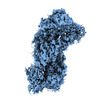 29001MC 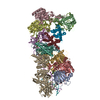 8fcjC 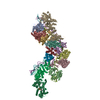 8fcuC 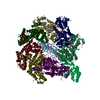 8fcvC 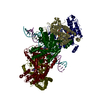 8fcwC 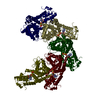 8fcxC 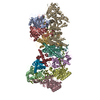 8fd2C 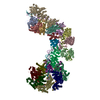 8ff4C 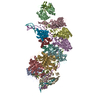 8ff5C M: map data used to model this data C: citing same article ( |
|---|---|
| Similar structure data | Similarity search - Function & homology  F&H Search F&H Search |
- Links
Links
- Assembly
Assembly
| Deposited unit | 
|
|---|---|
| 1 |
|
- Components
Components
-Type I-B CRISPR-associated protein ... , 4 types, 11 molecules ABCDEFGHJKL
| #1: Protein | Mass: 24852.906 Da / Num. of mol.: 1 Source method: isolated from a genetically manipulated source Source: (gene. exp.)  Nostoc sp. 'Peltigera membranacea cyanobiont' 210A (bacteria) Nostoc sp. 'Peltigera membranacea cyanobiont' 210A (bacteria)Gene: cas5 / Production host:   Escherichia coli (E. coli) / References: UniProt: A0A235IG00 Escherichia coli (E. coli) / References: UniProt: A0A235IG00 | ||
|---|---|---|---|
| #2: Protein | Mass: 24945.744 Da / Num. of mol.: 1 Source method: isolated from a genetically manipulated source Source: (gene. exp.)  Nostoc sp. 'Peltigera membranacea cyanobiont' 210A (bacteria) Nostoc sp. 'Peltigera membranacea cyanobiont' 210A (bacteria)Gene: cas6 / Production host:   Escherichia coli (E. coli) / References: UniProt: A0A235IH92 Escherichia coli (E. coli) / References: UniProt: A0A235IH92 | ||
| #3: Protein | Mass: 37298.996 Da / Num. of mol.: 6 Source method: isolated from a genetically manipulated source Source: (gene. exp.)  Nostoc sp. 'Peltigera membranacea cyanobiont' 210A (bacteria) Nostoc sp. 'Peltigera membranacea cyanobiont' 210A (bacteria)Gene: CDG76_09080 / Production host:   Escherichia coli (E. coli) / References: UniProt: A0A235IG15 Escherichia coli (E. coli) / References: UniProt: A0A235IG15#5: Protein | Mass: 16314.365 Da / Num. of mol.: 3 Source method: isolated from a genetically manipulated source Source: (gene. exp.)  Nostoc sp. 'Peltigera membranacea cyanobiont' 210A (bacteria) Nostoc sp. 'Peltigera membranacea cyanobiont' 210A (bacteria)Gene: CDG76_09085 / Production host:   Escherichia coli (E. coli) / References: UniProt: A0A235IGR9 Escherichia coli (E. coli) / References: UniProt: A0A235IGR9 |
-DNA chain , 2 types, 2 molecules NO
| #7: DNA chain | Mass: 3003.993 Da / Num. of mol.: 1 / Source method: obtained synthetically / Source: (synth.) synthetic construct (others) |
|---|---|
| #8: DNA chain | Mass: 13973.018 Da / Num. of mol.: 1 / Source method: obtained synthetically / Source: (synth.) synthetic construct (others) |
-Protein / RNA chain , 2 types, 2 molecules IM
| #4: Protein | Mass: 63474.328 Da / Num. of mol.: 1 Source method: isolated from a genetically manipulated source Source: (gene. exp.)  Nostoc sp. 'Peltigera membranacea cyanobiont' 210A (bacteria) Nostoc sp. 'Peltigera membranacea cyanobiont' 210A (bacteria)Gene: CDG76_09085 / Production host:   Escherichia coli (E. coli) / References: UniProt: A0A235IGR9 Escherichia coli (E. coli) / References: UniProt: A0A235IGR9 |
|---|---|
| #6: RNA chain |  Mass: 22876.527 Da / Num. of mol.: 1 / Source method: obtained synthetically / Source: (synth.) synthetic construct (others) |
-Experimental details
-Experiment
| Experiment | Method:  ELECTRON MICROSCOPY ELECTRON MICROSCOPY |
|---|---|
| EM experiment | Aggregation state: PARTICLE / 3D reconstruction method:  single particle reconstruction single particle reconstruction |
- Sample preparation
Sample preparation
| Component | Name: Ternary complex of Cascade proteins, crRNA and PAM only DNA Type: COMPLEX / Entity ID: all / Source: MULTIPLE SOURCES | ||||||||||||
|---|---|---|---|---|---|---|---|---|---|---|---|---|---|
| Source (natural) |
| ||||||||||||
| Source (recombinant) | Organism:   Escherichia coli (E. coli) Escherichia coli (E. coli) | ||||||||||||
| Buffer solution | pH: 7.5 | ||||||||||||
| Specimen | Embedding applied: NO / Shadowing applied: NO / Staining applied : NO / Vitrification applied : NO / Vitrification applied : YES : YES | ||||||||||||
Vitrification | Cryogen name: ETHANE |
- Electron microscopy imaging
Electron microscopy imaging
| Experimental equipment |  Model: Titan Krios / Image courtesy: FEI Company |
|---|---|
| Microscopy | Model: FEI TITAN KRIOS |
| Electron gun | Electron source : :  FIELD EMISSION GUN / Accelerating voltage: 300 kV / Illumination mode: FLOOD BEAM FIELD EMISSION GUN / Accelerating voltage: 300 kV / Illumination mode: FLOOD BEAM |
| Electron lens | Mode: BRIGHT FIELD Bright-field microscopy / Nominal defocus max: 2000 nm / Nominal defocus min: 800 nm Bright-field microscopy / Nominal defocus max: 2000 nm / Nominal defocus min: 800 nm |
| Image recording | Electron dose: 54 e/Å2 / Film or detector model: GATAN K3 BIOQUANTUM (6k x 4k) |
- Processing
Processing
| Software | Name: PHENIX / Version: 1.20.1_4487: / Classification: refinement | ||||||||||||||||||||||||
|---|---|---|---|---|---|---|---|---|---|---|---|---|---|---|---|---|---|---|---|---|---|---|---|---|---|
CTF correction | Type: PHASE FLIPPING ONLY | ||||||||||||||||||||||||
3D reconstruction | Resolution: 3.12 Å / Resolution method: FSC 0.143 CUT-OFF / Num. of particles: 204496 / Symmetry type: POINT | ||||||||||||||||||||||||
| Refine LS restraints |
|
 Movie
Movie Controller
Controller











 PDBj
PDBj
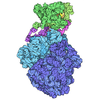
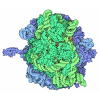
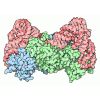

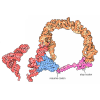
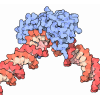
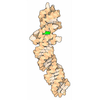
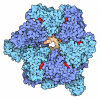


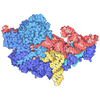
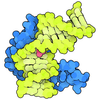
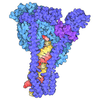
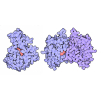

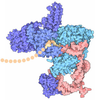


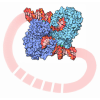
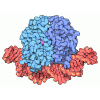
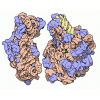
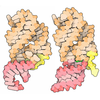

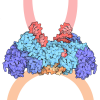



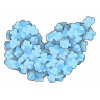
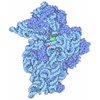

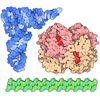



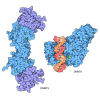


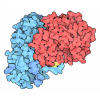


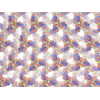
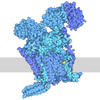


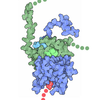




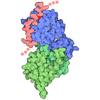

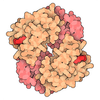
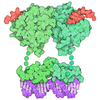


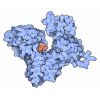
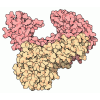

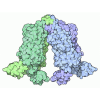




 Peltigera membranacea (fungus)
Peltigera membranacea (fungus)